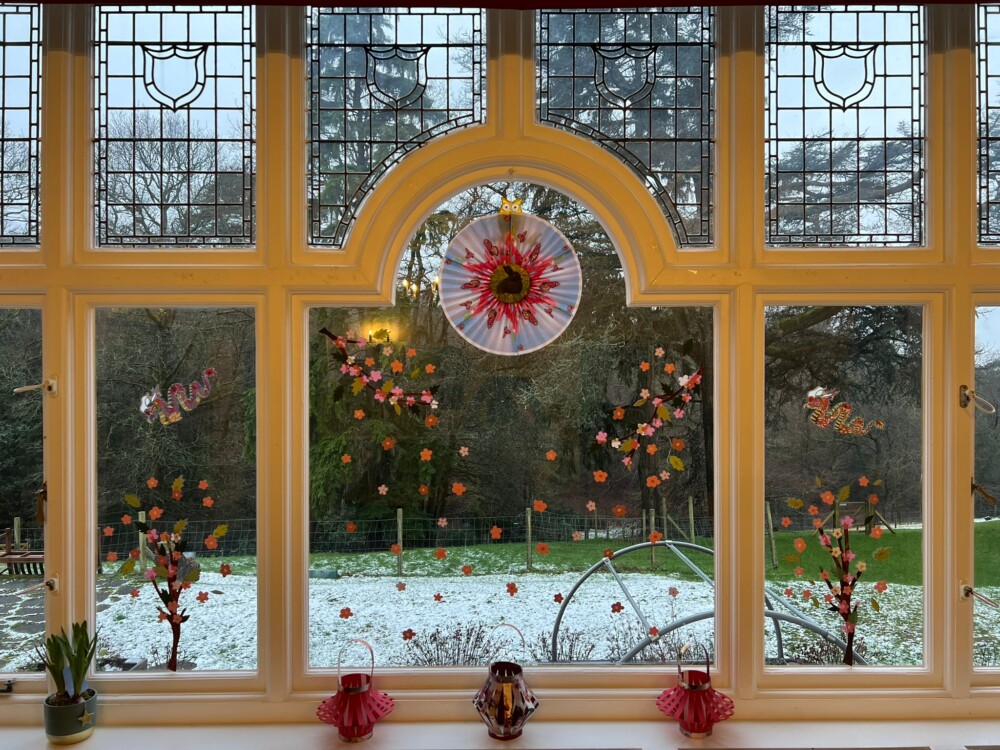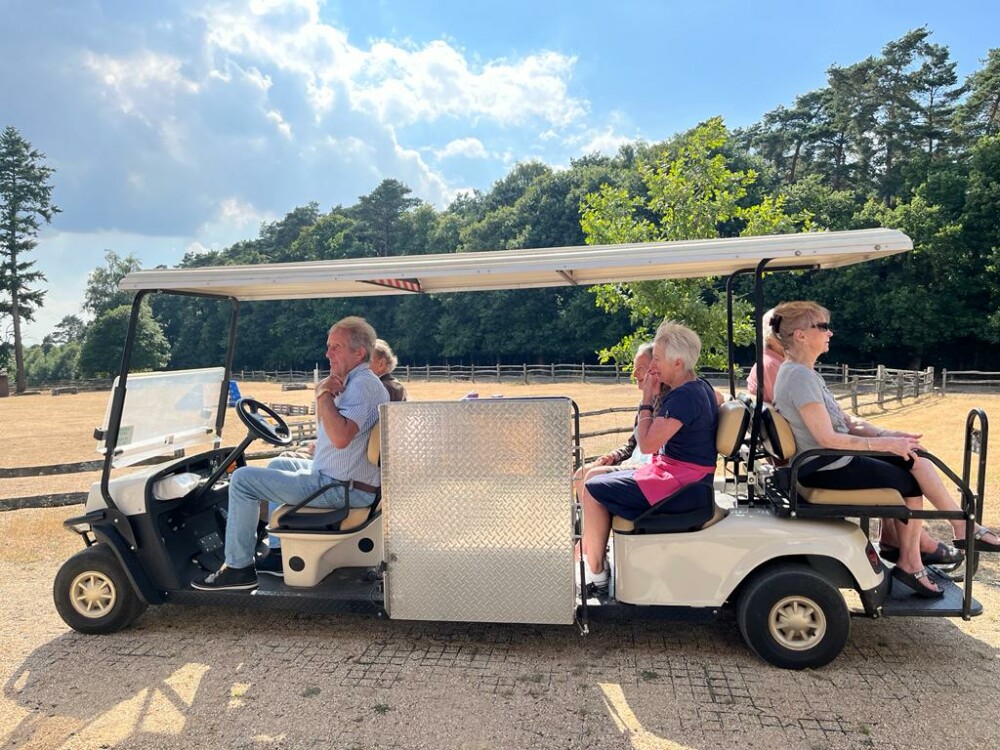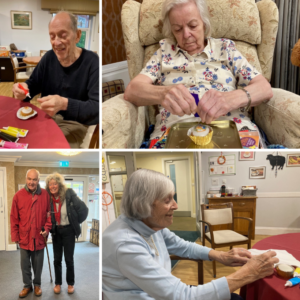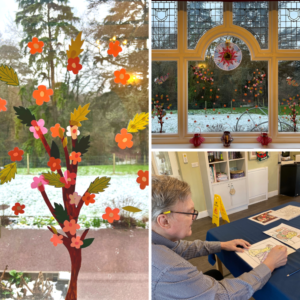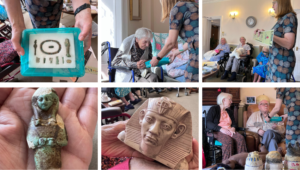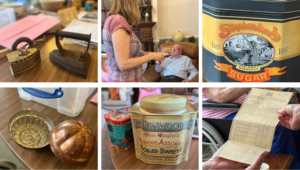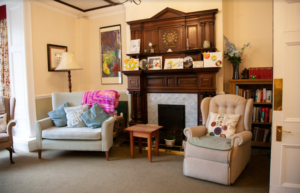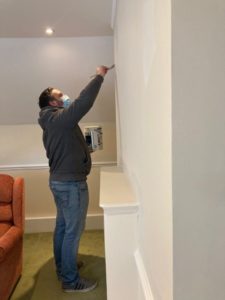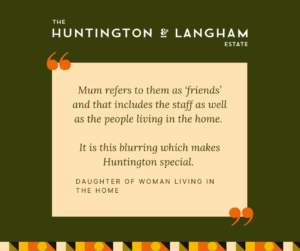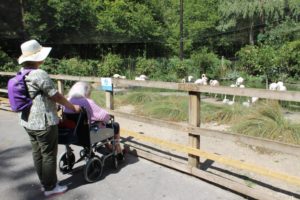Charlie Hoare, the Managing Director of The Huntington & Langham Estate recently gave a presentation about the benefits of respite care at the Rare Dementia Support carers’ meeting, based on our experience of supporting families who have also been supported by Rare Dementia Support.
Growing up in a residential care home
Like a lot of things in life, people have different perceptions when it comes to care homes. I happen to have a very positive association with care homes.
I grew up in a care home, spending the first 10 years of my life living on the top floor of Huntington House, our original care home on the Huntington and Langham Estate.
Even after that, I only lived a stone’s throw away in the original Estate lodge house to the main building. Close enough, in fact, that when I was home from boarding school for the summer holidays, one of the residents would make sure I wasn’t sleeping in too long by rattling his walking stick in the cat flap on his morning stroll and shouting to me and my sister that it was time to get up.
Despite these rude awakenings, or potentially because of them, I associate care homes with a feeling of homeliness, family-like connections, and even a sense of fun!
Feelings of mixed emotions when considering a move into a care home It is natural for anyone considering a move, to have mixed feelings about care homes, especially if they’ve have not yet had the opportunity to take a tour of a local home.
The most common emotions for carers researching their options are ones of hope mixed with an equal measure of guilt perhaps. Hope that there might be a place with a team of people who can offer the care that you’re finding impossible or at least very difficult to provide on your own at home and the guilt that comes from feeling that you should continue to manage on your own.
The impact of media headlines
It is not surprising given some of the headlines we’re exposed to, particularly during Covid-19, that people are fearful of care home, with stories of poor treatment, leading some people to be staunchly opposed to the idea of moving their loved one into a care home.
Sadly these situations do exist in some homes which is why the Care Quality Commission acting as a regulator is so important and even though we have a good CQC rating, we go beyond this and are independently audited by Meaningful Care Matters as Butterfly and Dragon fly homes.
When there is no option but to organise a move into a care home, I recommend to families to be careful about how they communicate some of these negative perceptions and the impact they may have if/when our loved ones makes the transition to a care home.
Changing perceptions at the School gate
I recently met a mum at my kids school, with a child in the same class as mine, who was talking to me about care homes recently. She asked if it was normal to be totally averse to her Mum going into a care home, even though her Dad was no longer able to look after her at home any more.
I asked why she was so averse to her mum making the move, and it turned out that she had volunteered at a care home when she was younger and had been horrified by how people in the home had been left for long periods, sometime hours, without anything to do, and she couldn’t possibly subject her beloved Mum to a future of the same.
Whilst this was an experience approximately 20 years ago, at one particular care home, it was enough to influence the family’s decision to postpone mum’s moving into any care home, even for respite care, despite the struggles of her dad.
I kept touching base with her occasionally at the school gates to see how they were getting on, and fast forward a few months, and her Mum had sadly had a fall at home and was now in hospital with a broken hip.
A week later she had been discharged to a care home along the Discharge to Assess Pathway, which is basically when a hospital has an agreement with a local care home to discharge people straight from hospital when they are medically fit, before they are then assessed as to whether they will go back home – with or without home care – or move to another more suitable or preferred care home.
After months of deliberation, the family had had little or no choice where their loved one’s first experience of a care home was, and they had the complication of settling into a new environment while also recovering from the trauma and surgery of the broken hip.
Transitioning into permanent care through a respite stay
This example is fairly representative of the reality of transitioning straight into permanent care for many, when a transition occurs in a crisis or an emergency situation that dramatically reduces the time we might have to choose the right care home, and prevents any opportunity for a trial run via a respite stay.
Transitions to care homes can be unsettling and disorientating at the best of times, even during respite stays. Some people are content from the start, some piece together the environment to fit a familiar place to them; a previous house, halls of residence, military accommodation, and settle in quickly. Others, however, are aware they are somewhere unfamiliar and struggle to make sense of it, and it can take longer for them to settle.
This is one of the benefits of respite stays. You will get to know how your loved one reacts to the care home environment, and what you might be able to try next time to make it easier. You then get the opportunity to reset and try again when the time is right.
The wider benefits of respite stays
Respite stays can help you ascertain whether the care home is right for other reasons. Is it easy to visit, and does it fit with your lifestyle, as well as meet the needs of your loved one?
Is your loved one going to be anxious about leaving the building for a walk or trip out? If so, are there areas of the home or grounds you can use instead.
Are there other people living in the care home that your loved one can form a social connection with? If not, can this need be met by a team member who they get on particularly well with.
During a respite stay you will likely find out information that you would not necessarily know from a brochure or show round.
A chance to spend quality time together with a loved one
Perhaps most importantly respite stays can help you maintain your core relationship with your loved one. You can use the time they are in a care home for quality time together rather than task-based interactions when you are having to do things for them rather than with them.
A couple of examples of this that have stuck in my mind…
One husband, whose wife stayed with us, used his time at home to create music playlists for his next visits. He and his wife used to love listening to music together, going to concerts, and dancing around the kitchen together. And for about half an hour almost every day when he visited, all the way into the later stages of her dementia, he would crank up the volume and would take her hands and transport them both back to those moments.
We had another person’s son who went away for work a lot, so his Dad would come in for periods of respite while he was away. When the son got back, usually a few days before the respite ended so he could unpack and do a food shop before his Dad returned home, he would come in for an hour or two each day and read his Dad The Jungle Book, which was his favourite book that his Dad had read to him in his childhood.
Many people may be concerned that you might miss being your loved one’s carer. Respite stays will give you a chance to work alongside the care team and continue being involved in certain aspects of care. And work out how you feel about the transition.
What you need to know about arranging a Respite stay
After saying all that, it can often be tricky to arrange respite care.
- No availability – Some care homes may be limited by availability, they may be full with people staying on a permanent basis. In this care, you could ask if they run a waiting list so that you are contacted when a room becomes available.
- No advanced booking – Other care homes may offer respite stays but may only take bookings a certain period in advance, and not be able to confirm availability until nearer the time.
- Minimum stay – Most care homes will have a minimum respite stay, usually around 2 weeks. This is mainly due to the workload associated with an admission. So, if you become a regular user of respite stays it may be worth trying to negotiate this with the care home.
- Respite retainer – I have heard of a care home offering a respite retainer whereby you purchase a block of respite and take it in weekly or fortnightly increments when availability allows.
- Respite timeshare – I have also heard of a care home that have built a number of rooms just for respite. I assume this will be offered on a kind of timeshare basis, whereby you book a certain week or fortnight each year or every few months.
- Funding – You may be entitled to FNC (Funded Nursing Care) payments for respite stays. £219.71 per week. Your local council may also fund respite stays based on financial and needs assessments.
Respite options are increasing as it is becoming more apparent that it is helpful for transitioning people into permanent care.
A final thought
I believe most of the barriers to respite care occur around the timing of people’s transitions to care homes; it’s not always an option if it’s left too late.
Remember…respite stays can’t work miracles but they can work wonders.
Please do get in touch if I can be of help with your care transition planning or if you would like to arrange a visit to the estate.


